7 Best Literature Review AI Tools in 2026
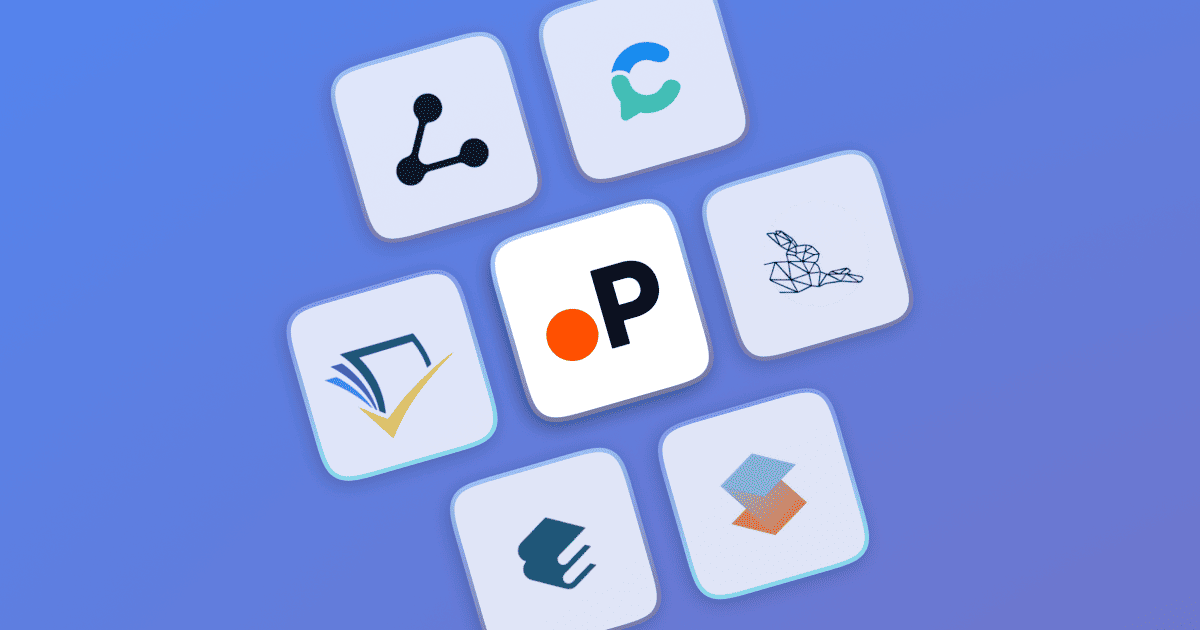
Conducting a literature review for a research paper can often be overwhelming and time-consuming. Researchers must sift through vast databases, critically evaluate sources, and meticulously manage citations, all while ensuring they don't overlook key studies. This manual process not only slows progress but also increases the risk of inconsistencies.
Fortunately, the research process is undergoing a major shift with the rise of AI and large language models (LLMs). In 2026, a variety of AI-assisted literature review tools are available, including free options that help researchers find relevant papers, summarise complex information, and organise sources more efficiently. However, with so many options available, choosing the right tool can still be a challenge.
In this blog, we explore the best AI tools for literature review in 2026. These tools support systematic literature reviews, academic research, and AI-powered literature search across various disciplines, helping researchers conduct their reviews more effectively.
What are the best literature review ai tools in 2026?
The best AI literature review ai tools in 2026 include Paperguide, Elicit, SciSpace, Scite, Consensus, Paperpal, and Zendy. These tools help researchers discover relevant papers, summarize findings, manage citations, and synthesize literature efficiently. Among these, Paperguide stands out as a top literature review ai tool, offering features like AI-powered search, citation management, and evidence-based synthesis that simplify the review process.
Best AI Tools for Literature Review in 2026
| Tool | Description |
|---|---|
| Paperguide | All-in-one AI research assistant for the complete literature review process, from search to writing. |
| Semantic Scholar | Free AI-powered academic search engine with smart paper discovery, summaries, and citation insights. |
| Elicit | AI tool for answering research questions by extracting and synthesizing evidence from academic papers. |
| Scispace | AI-powered PDF assistant that explains, summarizes, and chats with academic papers in real time. |
| Litmaps | Visual research discovery tool that maps citation connections and tracks your literature journey. |
| Research Rabbit | Free tool for exploring academic papers and building citation networks through visual research maps. |
| Consensus | AI search engine that delivers evidence-based answers from peer-reviewed research. |
Key Challenges in Literature Review
Completing a literature review without structured support can be time-consuming and difficult. Researchers often face recurring issues when searching, managing, and synthesising sources manually. The table below highlights the most common challenges in literature review workflows.
| Challenge | Description |
|---|---|
| Sifting Through Large Databases | Searching academic databases manually is slow and often leads to information overload. |
| Identifying Relevant Sources | Without advanced filtering, it can be hard to find the most relevant and up-to-date papers. |
| Managing Citations and References | Tracking sources across platforms increases the risk of errors, duplication, or missing entries. |
| Synthesising Key Findings | Summarising multiple studies manually is time-intensive and can lead to overlooked insights. |
| Maintaining Consistency and Scope | Without a clear structure, reviews may become disorganised or miss important research gaps. |
To address this challenge, many researchers rely on an AI research paper summarizer to extract key findings and limitations consistently across multiple studies.
Types of Literature Review
Before choosing the right AI tool, it’s important to understand that not all literature reviews follow the same structure. Different review types serve different research goals. Below are some of the most common types of literature review used in academic research.
| Type | Description | Best Use Case |
|---|---|---|
| Narrative Literature Review | A descriptive review without strict methods or protocols. | Early-stage research or topic exploration. |
| Systematic Literature Review | A structured, replicable review with defined criteria. | High-stakes academic research or healthcare studies. |
| Meta-Analysis | Uses statistical methods to combine results from multiple studies. | Data-driven synthesis across similar experiments. |
| Scoping Literature Review | Explores the range and scope of research on a broad topic. | Identifying research gaps or framing questions. |
| Integrative Literature Review | Combines qualitative and quantitative data across studies. | Interdisciplinary or comprehensive reviews. |
Quick Comparison: Features, Free Plans, and Best Use Cases
| Tool | Key Features | Free Plan | Best For |
|---|---|---|---|
| Paperguide | AI search, research summarisation, citation management, abstract generation | 5 generations/day, 2 deep reports/month | Students and researchers managing large source sets |
| Semantic Scholar | AI paper summaries, citation graph, research alerts | Full free access | Academic discovery and paper recommendations |
| Elicit | Research question answering, data extraction, evidence synthesis | 10 Pro analyses and snapshots/month | Systematic literature reviews and structured queries |
| Scispace | Chat with PDF, AI literature summariser, citation tools | Limited free features | Researchers working directly with academic PDFs |
| Litmaps | Visual citation maps, source tracking, collaboration tools | 20 inputs/month | Teams or individuals organising source relationships |
| Research Rabbit | Literature discovery, citation networks, real-time alerts | Free access | Exploring related research and citation chains |
| Consensus | AI answers based on peer-reviewed evidence, source links | Free with monthly limit | Reviewing claims across studies with evidence synthesis |
Now that we’ve compared features and access levels, let’s look at how each tool supports specific stages in the literature review process, including discovery, source evaluation, summarisation, and organisation.
1. Paperguide

Paperguide is an all-in-one AI research assistant built specifically for scientific workflows. It combines literature discovery, citation-backed synthesis, and structured writing support into a single platform. With features like AI Literature Review, Deep Research, AI Paper Writer, and AI Reference Manager, it simplifies everything from research discovery and source management to final manuscript preparation. This makes it especially useful for conducting systematic reviews, meta-analyses, and preparing scientific papers for publication.
In addition to its core features, the Paperguide Literature Review AI Tool streamlines the literature review process, helping researchers efficiently analyze, summarize, and synthesize key findings from scientific papers, making it an essential tool for scientific research workflows.
Core Features
- AI Literature Review: Paperguide’s AI literature review tool enables researchers to analyze large volumes of research papers quickly and accurately, saving time and improving the depth of their reviews. It automates the process of identifying key findings, synthesizing insights, and organizing results into structured formats.
- AI Search: Utilizes AI-powered search to surface the most relevant academic papers by topic or research question. It helps users pinpoint critical studies without manually sifting through extensive databases.
- Deep Research: Conducts systematic reviews by automating data extraction, generating citation-backed reports, and offering a thematic breakdown of the literature. This feature is ideal for those needing comprehensive evidence synthesis in a fraction of the time.
- AI Paper Writer: Drafts academic sections based on the research findings, ensuring your work is in a formal academic tone. This feature works seamlessly with the AI literature review to generate content aligned with your research objectives.
- AI Reference Manager: Efficiently manages citations across multiple formats, including BibTeX, RIS, Zotero, and DOI, allowing researchers to maintain a well-organized library of references.
In addition to its core features, the AI Literature Review offers a range of specialised functions that support the creation of comprehensive, evidence-based literature reviews.
Paperguide AI Literature Review Features
| Feature | Description |
|---|---|
| Add Papers | Organize papers in your research library. |
| Export | Export citations and summaries in various formats. |
| Manage Columns | Customize columns for better organization. |
| Create Custom Column | Add custom columns for specific metadata. |
| Default Columns | Revert to the default column layout. |
| Insights | Get data-driven insights from the literature. |
| TL;DR | Generate concise summaries of long papers. |
| Summary | Summarize key findings from each paper. |
| Research Question | Match papers to your research question. |
| Methodology | Summarize the methodologies used in studies. |
| Key Findings | Extract the main findings from papers. |
| Primary Outcomes | Highlight the primary outcomes of each study. |
| Limitations | Summarize study limitations. |
| Interventions | Extract interventions tested in the literature. |
| Conclusion | Summarize the conclusions of each paper. |
| Research Gaps | Identify gaps in the literature. |
| Funding Source | Display funding sources for papers. |
| Introduction Summary | Summarize the introduction of each paper. |
| Discussion Summary | Summarize the discussion section of papers. |
| Hypotheses Tested | Identify hypotheses tested in the studies. |
| Future Research | Highlight suggestions for future research. |
| Dependent Variables | Identify dependent variables in studies. |
| Independent Variables | Identify independent variables explored in research. |
| Study Design | Summarize the study design used in research. |
| Objectives | State the objectives of each study. |
Paperguide serves as an all-in-one AI tool for literature review, combining features like AI-powered search, citation management, and automated report generation.
How Paperguide’s Deep Research Automates Literature Review Process

Deep Research automates systematic literature reviews by scanning academic databases, extracting structured data, and producing citation-backed reports. Simply enter your research question, and the tool returns a complete overview of the relevant literature, including detailed summaries, key findings, and research gaps.

Within 10 minutes, a full Deep Research report is generated.
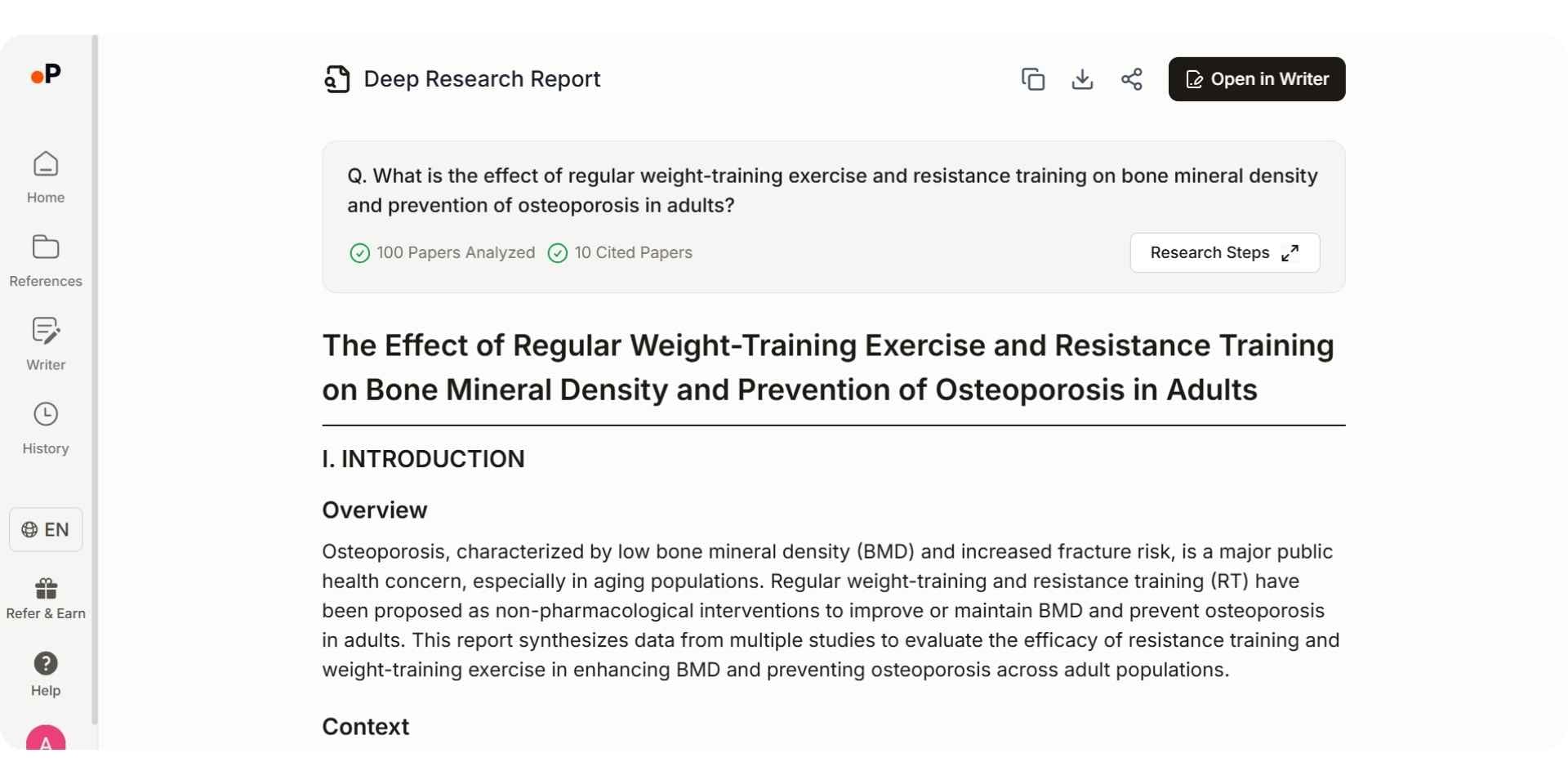
In your dashboard, you'll see a breakdown that includes:
- Number of papers analysed
- Cited references with proper formatting
- Thematic grouping and research steps
You can open the output directly in Paperguide's AI Paper Writer to incorporate findings into your manuscript or thesis.
Pros
- Complete workflow from search to writing
- Highly effective for systematic reviews and academic reports
- Research-focused layout and tools with low learning curve
Cons
- Free plan limited to 2 Deep Research reports per month
- Most effective with well-defined research questions
Best For
Academic researchers, graduate students, and PhD scholars who need an end-to-end AI tool for literature review automation, reference management, and structured writing.
Pricing
- Free Plan – $0/month5 AI generations/day, 2 Deep Research reports/month, 500MB storage
- Plus Plan – $12/month (billed annually)Unlimited AI generations, 10 Deep Research reports/month, plagiarism checker, and more
- Pro Plan – $24/month (billed annually)Up to 50 Deep Research reports/month, 20 full document generations, advanced citation and analysis features
Verdict
Paperguide is one of the best literature review ai tools in 2026. It supports the entire research process from source discovery to structured writing and citation management. Features like Deep Research and AI Literature Review help automate synthesis and summarisation with proper academic structure. With a free plan and affordable upgrades starting at $12 per month, it offers practical options for students, researchers, and thesis writers managing complex literature reviews.
2. Semantic Scholar
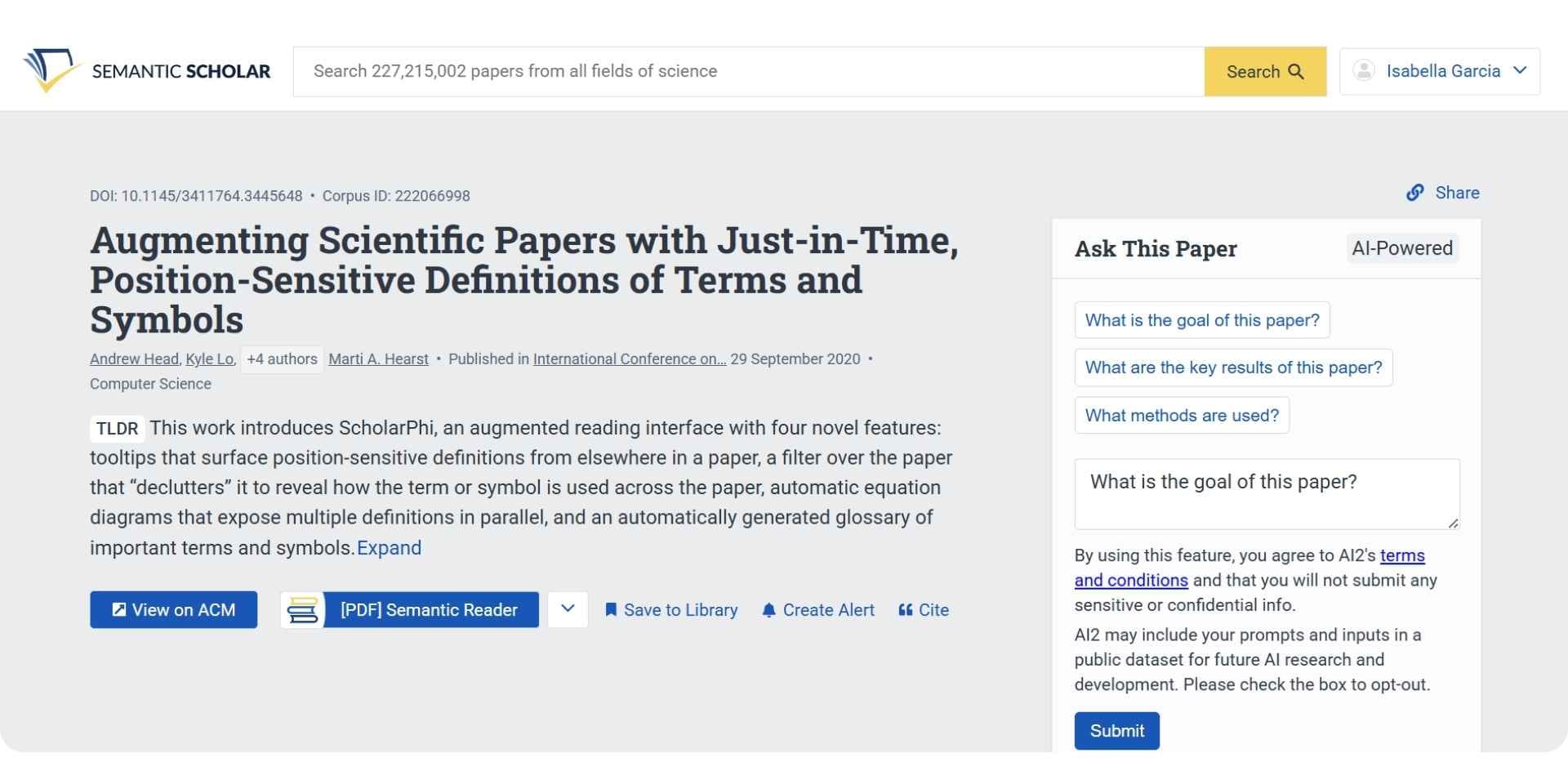
Semantic Scholar is a free AI-powered academic search engine that supports literature review by automating the discovery and evaluation of research papers. It uses semantic search, citation mapping, and AI-generated summaries to help users identify key findings and prioritise relevant studies more efficiently.
Key Features
- AI-generated summaries: Automatically summarises academic papers to highlight key insights
- Semantic search: Delivers more accurate results by analysing context, not just keywords
- Citation graphs: Visualises how papers are connected through citations
- Paper prioritisation: Ranks research by impact, quality, and relevance
Pros
- Quickly understand papers through summarised content
- Useful citation network visualisations for research context
- More accurate than traditional search engines for academic queries
- Saves time during early-stage literature review
Cons
- Limited coverage of non-English publications
- Some advanced features require institutional or partner access
- Citation graphs may have a learning curve for new users
Best For
Researchers and students who want to streamline literature review in research papers, identify high-impact studies, and explore citation networks efficiently.
Pricing
Free to use with full access to core features. No subscription required.
Verdict
Semantic Scholar is one of the most accessible AI tools for literature review in 2026. It simplifies research discovery with semantic search, visual citation maps, and AI-generated summaries that help researchers quickly evaluate sources. While it doesn’t offer writing or citation management tools, its free access and focused features make it a valuable resource for finding and prioritising high-quality academic papers.
3. Elicit
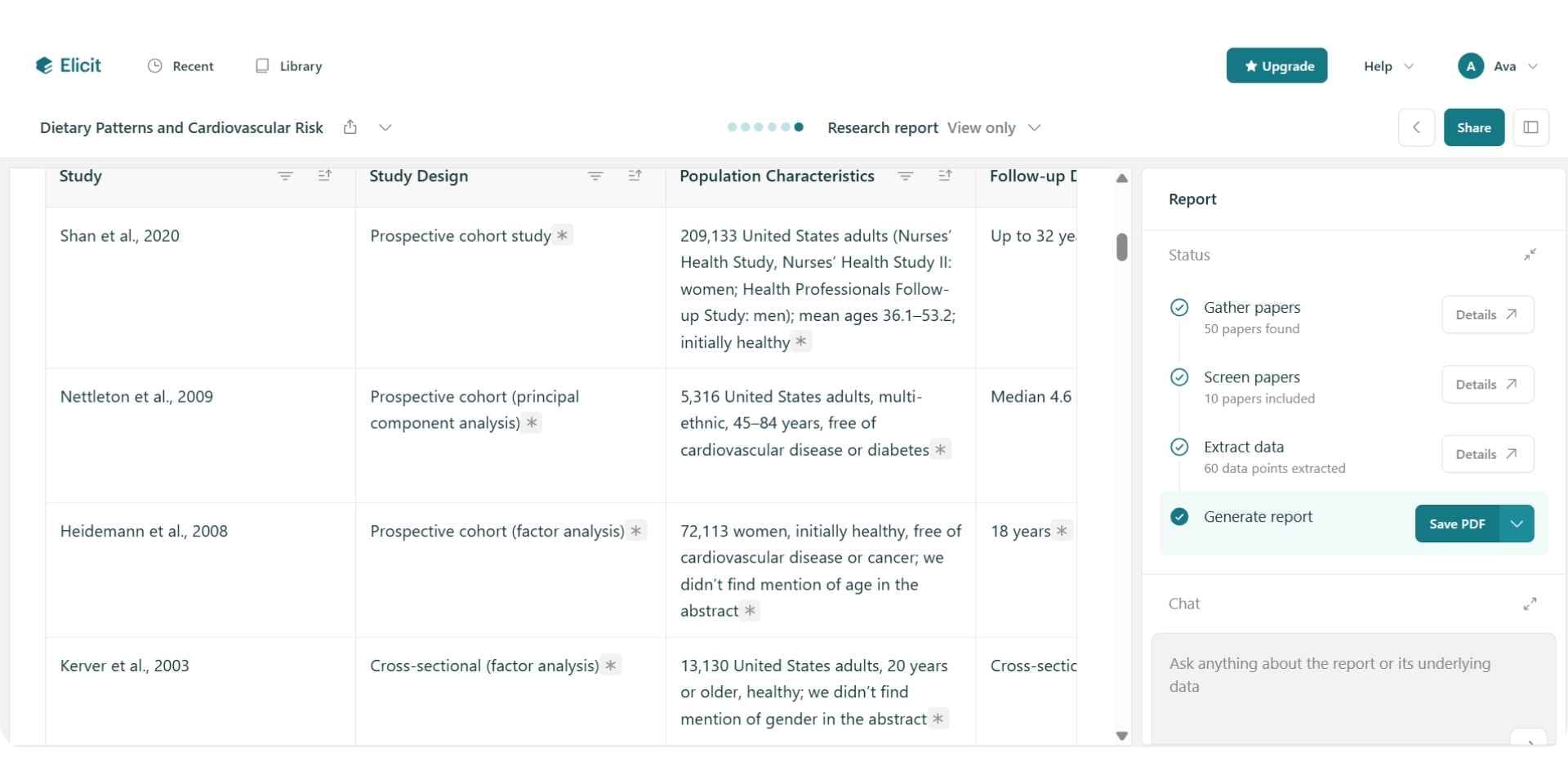
Elicit is an AI research assistant designed to streamline literature reviews by automating data extraction, summarisation, and synthesis. It enables researchers to analyse and organise academic papers efficiently, enhancing the depth and speed of their reviews.
Key Features
- Automated Literature Discovery: Uses semantic search to identify relevant papers from a vast database of over 125 million sources
- Data Extraction: Automatically extracts key data points from research papers, such as methodologies, findings, and statistical data
- Evidence Synthesis: Organises extracted information into structured tables for easier comparison across studies
- Customisable Templates: Offers template creation for systematic reviews, ensuring consistency and efficiency
- Collaborative Tools: Supports team collaboration by enabling shared access to research notes and findings
Pros
- Speeds up the literature review process by automating time-consuming tasks
- Increases review comprehensiveness with semantic search capabilities
- Facilitates collaboration within research teams
Cons
- Requires manual verification of extracted data for accuracy
- Systematic review features are only available on the Pro plan
- Limited support for non-empirical research domains
Best For
Researchers conducting systematic literature reviews, particularly in empirical fields like biomedicine and machine learning.
Pricing
Free plan available. Paid plans start at $12/month.
Verdict
Elicit is a powerful tool for systematic literature reviews, especially in empirical research fields. Its ability to automate data extraction and organise findings helps researchers save time and increase the depth of their reviews. However, the lack of some features on the free plan and the need for manual data verification might require some additional effort for users.
4. Scispace
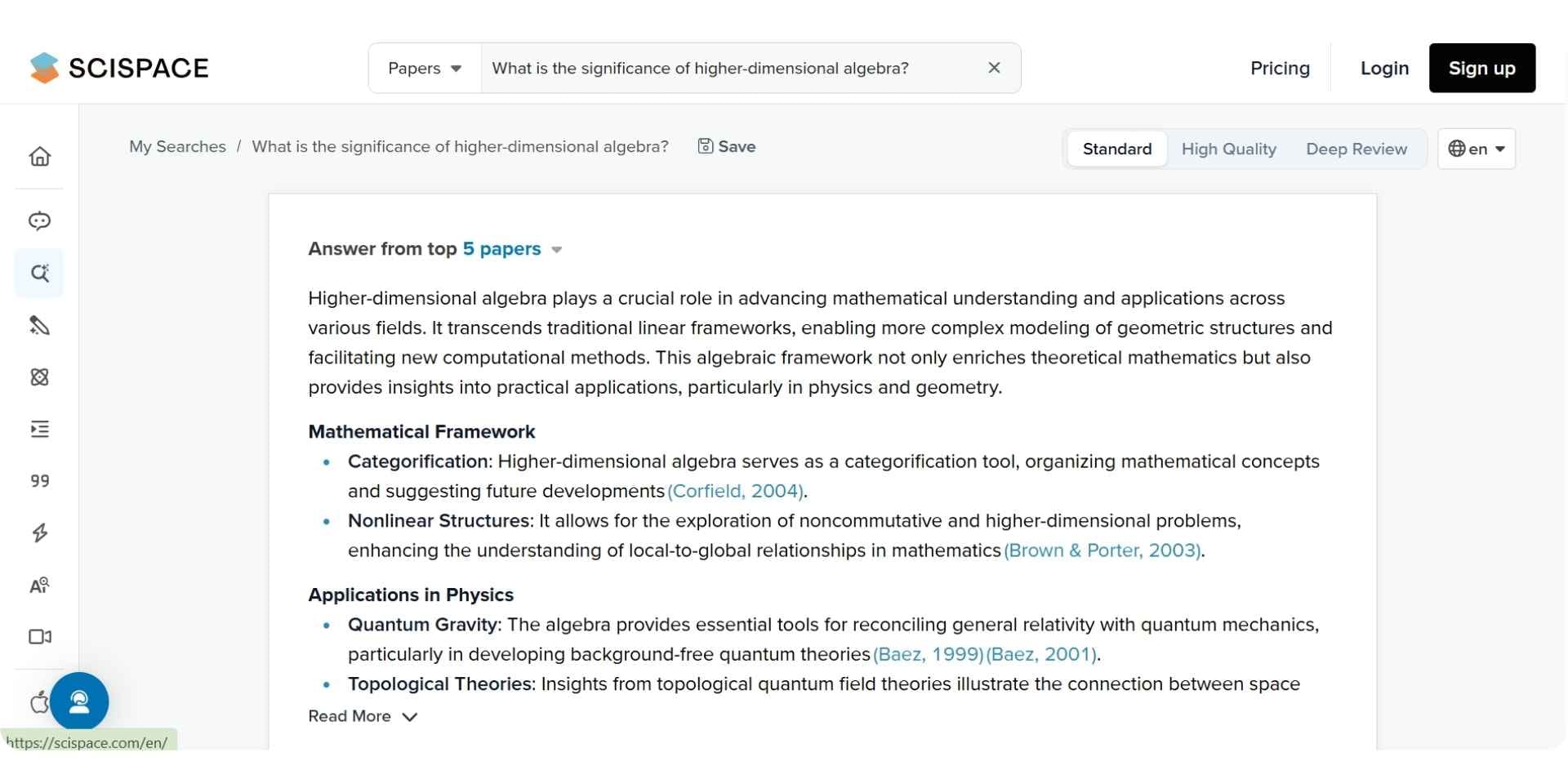
Scispace is an all-in-one AI research assistant designed to enhance the literature review process for students and researchers. It allows users to interact with PDFs, extract key information, and synthesize insights from research papers without having to read them line by line. Scispace is ideal for researchers who need to quickly understand complex content and extract critical data for their literature reviews.
Key Features
- Chat with PDFs: Engage with research papers by asking follow-up questions and getting key insights from the text
- Follow-up Q&A: Ask specific questions about the paper’s content and receive direct answers from the text
- Technical Content Explanation: Simplifies complex research content and provides easy-to-understand explanations
- Real-Time Annotation: Annotate PDFs as you read, highlighting important sections and ideas
- Literature Review: Automates the process of synthesizing key findings from multiple papers into a cohesive literature review
Pros
- Real-time interaction with PDFs helps researchers stay engaged and focused
- Saves time by automating data extraction and synthesis from complex papers
- Ideal for interdisciplinary research, simplifying technical content across fields
Cons
- Limited to PDF format; other document formats may not be fully supported
- Some advanced features are only available in paid plans
Best For
Researchers, students, and academics who want to streamline the literature review process and easily extract key insights from complex research papers.
Pricing
Free plan available. Paid plans range from $20 to $90/month, depending on the features and usage limits.
Verdict
Scispace is a strong AI tool for literature review, especially for those dealing with complex or technical research. Its ability to interact with PDFs, automate synthesis, and simplify technical content makes it a valuable resource for researchers across disciplines. However, its limitation to PDF format and the advanced features being behind a paywall may make it less versatile for some users.
5. Litmaps

Litmaps is an AI-powered literature review assistant designed to help researchers visualize, organize, and track their literature review process. Using dynamic mind maps, Litmaps enables users to map connections between research papers, track their research journey, and gain insights into how studies are related. This makes it an invaluable tool for those working on complex literature reviews.
Key Features
- Advanced Discovery Tools: Access unlimited searches, custom filters, and faster paper discovery. Sync with your Zotero account for streamlined management.
- Visualization: Create interactive mind maps to visualize connections between papers, making it easier to track your research journey.
- Collaboration: Share mind maps with colleagues, students, and advisors for better collaboration.
- Research Monitoring: Stay updated with email alerts when new papers on your topic are published.
- Customizable Search Filters: Narrow results with filters based on connections, citations, and references for more precise research.
Pros
- Powerful visualization tools for mapping out connections between research papers
- Real-time collaboration with peers and advisors for more effective teamwork
- Custom search filters to quickly find relevant papers
Cons
- The free plan is limited to 20 inputs and basic features
- Visualization options can take time to master for new users
Best For
Researchers, students, and academic teams who want a visual, interactive tool to track and organize their literature review process.
Pricing
- Free Plan: Basic search and up to 20 inputs
- Pro Plan: $12.50/month for advanced features, unlimited searches, and full access to mind map functionality
- Team Plan: Custom pricing for teams and institutions with enhanced collaboration features
Verdict
Litmaps is a valuable tool for those looking to visually map and organize their literature review process. Its interactive mind maps and real-time collaboration features make it particularly useful for academic teams and researchers working on complex, interdisciplinary topics. However, its free plan's limitations and the learning curve of visualization tools may be a drawback for some users.
6. Research Rabbit

Research Rabbit is an AI-powered tool that simplifies discovering, organizing, and visualizing academic literature. It allows researchers to explore related papers, track citations, and create research maps. Using citation networks and AI algorithms, Research Rabbit accelerates the literature review process and provides insight into how studies connect and evolve over time.
Key Features
- Literature Discovery: Find relevant papers by following citations and references from initial seed papers
- Visualization: Create citation networks to show relationships between research papers
- Collaborative Tools: Share research collections and collaborate with team members
- Integration with Zotero: Sync your research library with Zotero for more efficient reference management
- AI-Powered Paper Recommendations: Receive AI-driven suggestions based on your research interests and existing papers
Pros
- Completely free with no premium versions or hidden fees
- Simple interface that streamlines paper discovery and organization
- Effective collaborative features for team-based research projects
Cons
- Relies on an older database (Microsoft Academic Graph) that may not include the latest papers
- Primarily focused on journal articles, excluding other forms of academic content like books and grey literature
- Can become cluttered when managing large collections of papers
Best For
Researchers, students, and academic teams who need an AI-powered tool to quickly discover and organize academic literature, particularly those focused on journal articles.
Pricing
Free plan available with full access to all features.
Verdict
Research Rabbit is a great free tool for quickly exploring academic papers, discovering connections, and building citation networks. Its simplicity and powerful collaborative features make it ideal for team-based research. However, its reliance on an older database and focus on journal articles may limit its use for researchers seeking the most up-to-date or comprehensive collection of academic literature.
7. Consensus
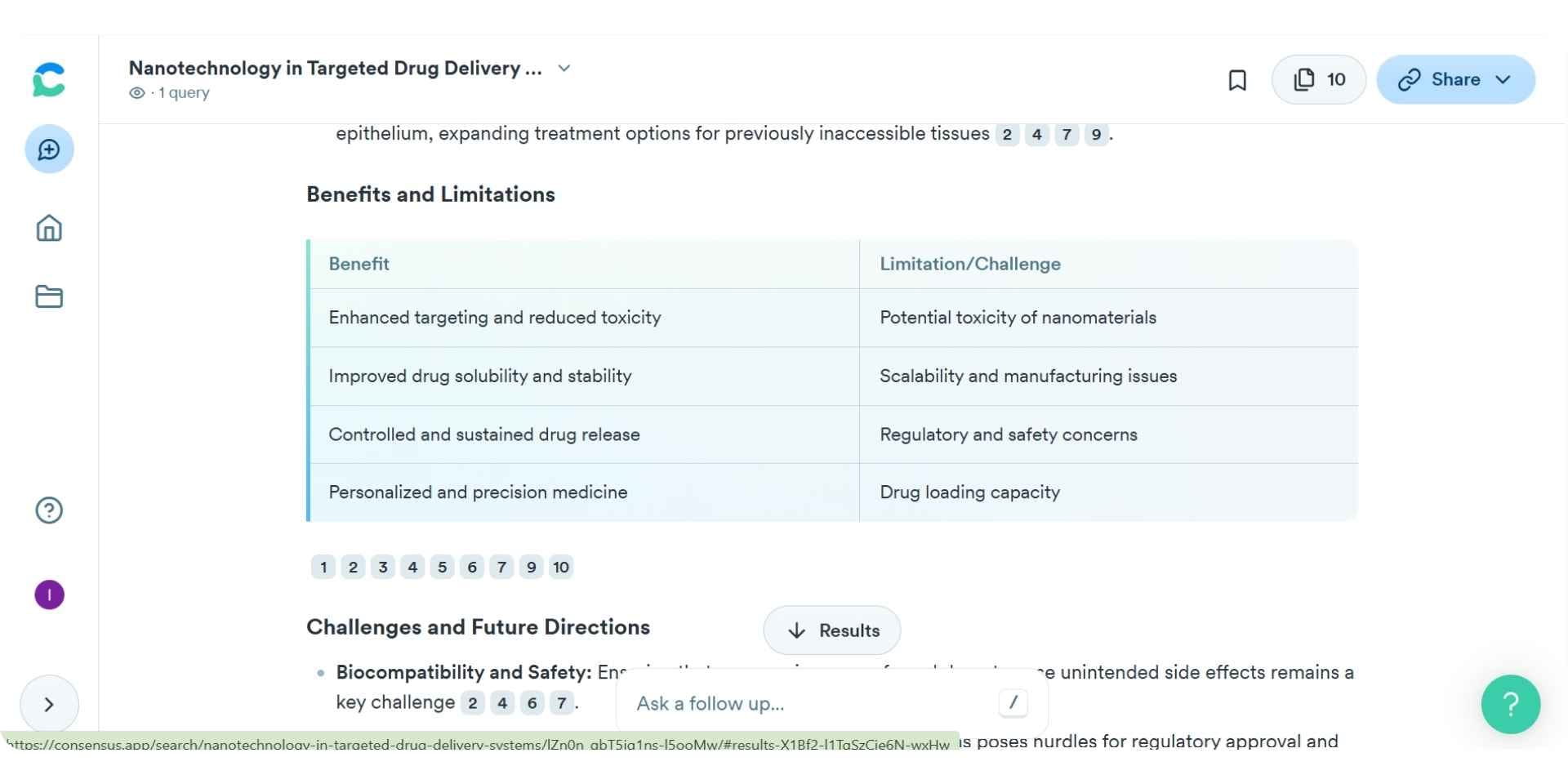
Consensus is an AI-powered academic search engine that helps researchers quickly find and analyze over 200 million peer-reviewed research papers. It automates evidence-based answers and data synthesis, streamlining the literature review process.
Key Features
- AI-Powered Search: Access a vast database of over 200 million peer-reviewed research papers
- Evidence-Based Answers: Automatically synthesizes findings to answer research questions
- Pro Analyses & Snapshots: Provides in-depth analysis and quick summaries of research papers
- Ask Paper: Extract key insights from research papers using AI-powered Q&A
- Bookmarks & Custom Lists: Organize and manage your research library for easier access
Pros
- Fast, automated evidence synthesis for quick research insights
- Access to an extensive database of peer-reviewed research papers
- Easy-to-use interface for seamless navigation
Cons
- Some advanced features require a premium plan
- AI-generated insights may require further human interpretation for accuracy
Best For
Researchers and academics who need an AI tool to synthesize research findings quickly and efficiently, especially for systematic reviews.
Pricing
- Free: $0/month (Limited features)
- Premium: $11.99/month
- Teams: $12.99/seat/month
Verdict
Consensus is a highly efficient tool for synthesizing research and quickly answering questions from a large database of peer-reviewed papers. Its ability to automate evidence-based answers makes it especially valuable for researchers conducting systematic reviews. However, some of the more advanced features are locked behind a premium plan, and users may need to validate AI insights further.
How AI Literature Review Tools Enhance Research Efficiency
Conducting a thorough literature review for your research can often be a time-consuming and overwhelming task. Researchers must sift through large academic databases, identify relevant studies, summarize key findings, and manage citations, all of which require significant effort. Fortunately, AI literature review tools, like Paperguide, have revolutionized this process, helping researchers complete reviews in a fraction of the time.
By leveraging AI for literature review, researchers can automate much of the manual work, such as literature discovery, synthesizing findings, and citation management. With Paperguide, researchers can quickly identify the most relevant papers, generate citation-backed summaries, and automatically categorize findings into structured reports. This allows more time to focus on the interpretation and writing of the research, leading to increased productivity and efficiency.
Key Benefits:
- AI-powered search for discovering relevant research
- Automatic summarization of findings
- Streamlined citation management with support for multiple formats (e.g., BibTeX, RIS, Zotero, DOI)
- Automated synthesis of research results into structured insights, ideal for systematic reviews and meta-analyses
- Free online literature review generator: Available to get started with the review process without any charge for the first set of research insights
Using Paperguide’s AI literature review tool, researchers can expedite their workflow, enhance the quality of their literature reviews, and improve their overall research outcomes.
Best Practices for Using AI Tools in Literature Review
As AI tools for literature review become more advanced, researchers need to understand how to use them effectively to ensure accuracy and maximize efficiency. Below are some best practices for getting the most out of your AI literature review tools:
- Define Clear Research Questions: Before using an AI literature review tool, it’s essential to have a clearly defined research question. This helps the tool, like Paperguide, identify the most relevant research papers efficiently. With AI for literature review, researchers can focus on deepening their analysis rather than spending time sifting through thousands of irrelevant studies.
- Integrate with Citation Management: Combining AI literature review tools with citation management systems, such as Zotero or EndNote, can streamline the research process even further. Paperguide’s AI Reference Manager helps organize citations across various formats like BibTeX, RIS, and DOI, ensuring seamless integration with your workflow.
- Verify Extracted Data: While AI tools for literature review like Paperguide automate data extraction, it's still important to verify the AI-generated insights. For accurate results, always double-check summaries and findings, especially when using AI literature review tools for systematic reviews.
- Leverage Multiple AI Tools for Full Research Support: Using multiple AI tools for literature review in your research process can boost productivity. Start with Paperguide’s AI Search to find papers, then use AI Literature Review to synthesize key findings, and finally draft your manuscript with AI Paper Writer. This way, you get a full research workflow powered by AI literature review tools.
Best Practices Summary:
- Clarify your research question for better AI-powered search results
- Integrate AI tools with citation management platforms for easier organization
- Double-check AI-generated data to ensure methodological accuracy
- Use a combination of AI tools to optimize the entire research process
Final Verdict
As we move into 2026, the way we conduct literature reviews has fundamentally changed, thanks to AI-powered literature review tools. These innovative solutions not only automate the search for relevant research but also help in synthesizing findings, managing citations, and even drafting research papers. Tools like Paperguide have changed the literature review process by offering a complete research workflow with features like Deep Research, AI Paper Writer, and AI Search.
These tools, which assist in systematic reviews and data analysis, offer researchers a faster, more efficient way to organize their research and create high-quality reviews. Whether you're an academic, student, or researcher, utilizing AI-driven literature review solutions will enable you to manage your research more effectively and reduce the time spent on manual tasks, ultimately enhancing the overall quality of your work.
Frequently Asked Questions
What is an AI-powered literature review tool?
An AI-powered literature review tool uses artificial intelligence to assist researchers in discovering relevant research papers, summarizing key findings, extracting valuable insights, and organizing sources effectively. These tools reduce the manual effort involved in the review process and improve the accuracy of results, particularly when working with large volumes of academic literature.
How can AI tools help with systematic literature reviews?
AI tools, like Paperguide, enhance systematic literature reviews by automating tasks such as study discovery, screening, data extraction, and synthesis. By automating these labor-intensive processes, researchers can quickly process more papers and ensure methodological rigor while maintaining transparency.
Which is the best literature review ai tool in 2026?
Paperguide is considered the best AI literature review tool for 2026, particularly for scientific research. It supports end-to-end literature review workflows, including semantic search, automated synthesis, and citation-backed summaries, making it ideal for both systematic and narrative reviews.
Why is Paperguide considered the best AI literature review tool for scientific research in 2026?
Paperguide stands out as it combines AI Literature Review, Deep Research, reference management, and academic writing tools into a single platform. This allows researchers to seamlessly move from paper discovery to synthesis and writing without switching tools, making it ideal for thesis work, systematic reviews, and meta-analyses.
Can I use AI literature review tools for free?
Yes, many AI literature review tools, including Paperguide, offer free plans with limited features. Paperguide’s free plan includes basic literature review capabilities and a limited number of Deep Research reports, making it a great option for students and early-stage researchers.
What is an RRL Generator or RRL Maker, and how does it help with literature reviews?
An RRL Generator (Research Review Literature Generator) or RRL Maker is an AI-powered tool designed to automate the process of generating systematic literature reviews. By analyzing large volumes of academic papers, these tools can extract key findings, summarize research, and help researchers identify research gaps efficiently. Tools like Paperguide support this by offering automated AI Literature Review features that synthesize findings, manage citations, and provide structured reports, significantly speeding up the review process.
Can AI tools handle interdisciplinary literature reviews?
Yes, modern AI literature review tools, such as Paperguide, utilize semantic search and contextual understanding to analyze research across multiple disciplines. This makes them especially effective for conducting interdisciplinary literature reviews, which traditional keyword search often struggles to handle.
How much time can AI tools save during a literature review?
AI tools, like Paperguide, can reduce the time spent on a literature review from weeks or months to just hours or days. By automatically generating structured, citation-backed literature summaries and research reports, these tools significantly accelerate the review process and enhance productivity.
Are AI literature review tools suitable for beginners?
Yes, many AI literature review tools are designed with intuitive interfaces and guided workflows, making them ideal for beginners. Paperguide is suitable for students, graduate researchers, and experienced academics, offering structured outputs that help users learn and apply proper literature review methods efficiently.





